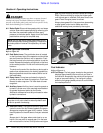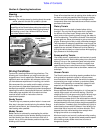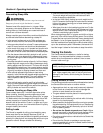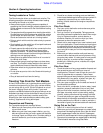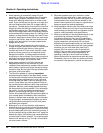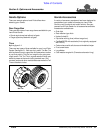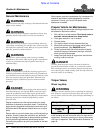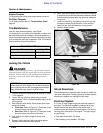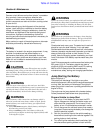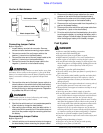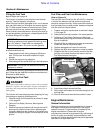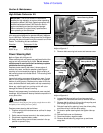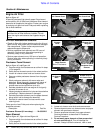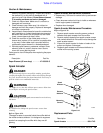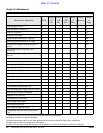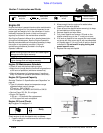
Section 6: Maintenance
4400EX Heavy Duty Off Road Utility Vehicle 720-051M
6/30/05
24
Table of Contents
Common circuit failures can be from “shorts”, corroded or
dirty terminals, loose connections, defective wire
insulation or broken wires. Switches, solenoids and
ignition components can also not function, causing a short
or open circuit.
Before attempting any fault diagnosis of the electrical
system, use a test light or voltmeter to check the battery
voltage. If the battery voltage is satisfactory, check the
cleanliness and tightness of the terminals and ground
connections. A general understanding of electrical
servicing and use of basic test equipment is necessary for
troubleshooting and repair.
Major overhaul or repair of the starting motor or alternator
should be performed by trained technicians only.
Battery
The battery is located in the engine compartment. It may
be either a maintenance-free sealed battery or a
maintenance-free battery with removable vent caps.
Inspect your battery and know which battery your have.
Water can not be added to sealed batteries as the vent
caps are not removable.
!
CAUTION
Do not overfill battery with water. Electrolytes may overflow
and damage paint, wiring or structure. Use soap and water to
clean the battery. Be careful not to get soap and water into the
battery. Use baking soda mixed in water to clean corrosion off
the terminals.
!
WARNING
Acid can cause serious injury to skin and eyes. Avoid skin
contact with battery acid and always wear eye protection when
checking the battery. Flush area with clean water and call a
physician immediately. Acid will also damage clothing.
!
WARNING
Incorrect battery cable connections can damage vehicle’s
electrical system and cause battery cables to spark. Sparks
around a battery can result in a battery gas explosion and
personal injury.
• Always disconnect negative (black) battery cable before
disconnecting positive (red) cable.
• Always reconnect positive (red) battery cable to the
positive (+) postbefore reconnecting negative (black) cable
to the negative (-) post.
!
WARNING
Sparks can cause a battery gas explosion which will result in
personal injury. Keep batteryterminals from touching any metal
parts when removing or installing the battery. Do not allow
metal tools to short betweenbattery terminals and metal vehicle
parts.
!
WARNING
Do not allow an open flame near the battery when charging.
Hydrogen gas forms inside the battery. This gas is both toxic
and flammable and may cause an explosion if exposed to a
flame.
Check water level once a year. The water level in each cell
should be up to the level indicator. If not, add water.
Distilled water should be usedto fill each cell in the battery.
However, tap water may be used if tap water is not hard or
does not have high mineral or alkali content. Do not
overfill. Have the charging system checked by your local
Land Pride dealer if the battery requires water every few
months.
Land Pride recommends a maintenance-free battery size
BCI group U1/U1R. The battery should also have a
minimum of 300 cold cranking AMP’s and 375 cranking
AMP’s at 32
o
F. Always follow the manufacturer’s
maintenance, safety, storing and charging specifications.
Jump Starting the Battery
Refer to Figure 6-3
The battery will discharge if the lights or any other
electrical equipment is left on after the engine has stopped
running. Also, the battery will discharge if the lights or
power plug outlet is used over a prolong period while the
engine is idling.
The engine can be jump-started with a booster battery.
Follow procedures listed below when jump-starting.
Prepare Vehicle to Jump-Start
1. Use only a 12-volt battery to jump-start the ATR.
Higher voltages can damage the starter motor and
other electrical components. Do not use a 24 volt
battery or two 12-volt batteries connected in series.
2. Do not disconnect the vehicle’s battery that needs a
jump-start. Disconnecting the battery can damage the
vehicle’s electrical system.
3. Park the live vehicle close to the vehicle needing a
boost without touching the two vehicles together. Set
parking brake on both vehicles.
4. Turn off all ignition switches, electric switches, light
switches and set parking brakes on both vehicles.



